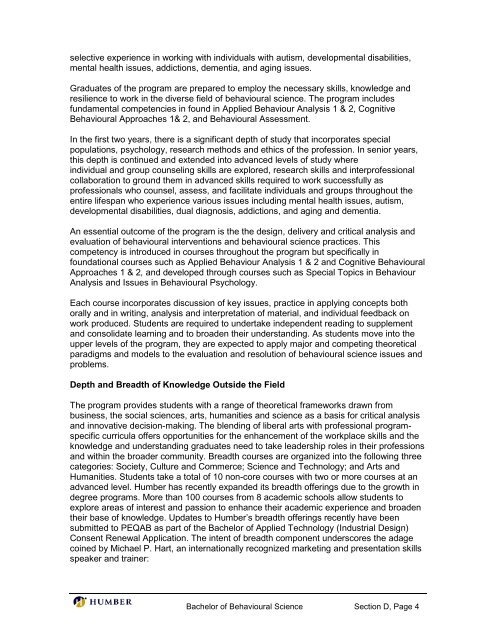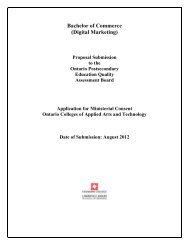Bachelor of Behavioural Science - Postsecondary Education Quality ...
Bachelor of Behavioural Science - Postsecondary Education Quality ...
Bachelor of Behavioural Science - Postsecondary Education Quality ...
You also want an ePaper? Increase the reach of your titles
YUMPU automatically turns print PDFs into web optimized ePapers that Google loves.
selective experience in working with individuals with autism, developmental disabilities,<br />
mental health issues, addictions, dementia, and aging issues.<br />
Graduates <strong>of</strong> the program are prepared to employ the necessary skills, knowledge and<br />
resilience to work in the diverse field <strong>of</strong> behavioural science. The program includes<br />
fundamental competencies in found in Applied Behaviour Analysis 1 & 2, Cognitive<br />
<strong>Behavioural</strong> Approaches 1& 2, and <strong>Behavioural</strong> Assessment.<br />
In the first two years, there is a significant depth <strong>of</strong> study that incorporates special<br />
populations, psychology, research methods and ethics <strong>of</strong> the pr<strong>of</strong>ession. In senior years,<br />
this depth is continued and extended into advanced levels <strong>of</strong> study where<br />
individual and group counseling skills are explored, research skills and interpr<strong>of</strong>essional<br />
collaboration to ground them in advanced skills required to work successfully as<br />
pr<strong>of</strong>essionals who counsel, assess, and facilitate individuals and groups throughout the<br />
entire lifespan who experience various issues including mental health issues, autism,<br />
developmental disabilities, dual diagnosis, addictions, and aging and dementia.<br />
An essential outcome <strong>of</strong> the program is the the design, delivery and critical analysis and<br />
evaluation <strong>of</strong> behavioural interventions and behavioural science practices. This<br />
competency is introduced in courses throughout the program but specifically in<br />
foundational courses such as Applied Behaviour Analysis 1 & 2 and Cognitive <strong>Behavioural</strong><br />
Approaches 1 & 2, and developed through courses such as Special Topics in Behaviour<br />
Analysis and Issues in <strong>Behavioural</strong> Psychology.<br />
Each course incorporates discussion <strong>of</strong> key issues, practice in applying concepts both<br />
orally and in writing, analysis and interpretation <strong>of</strong> material, and individual feedback on<br />
work produced. Students are required to undertake independent reading to supplement<br />
and consolidate learning and to broaden their understanding. As students move into the<br />
upper levels <strong>of</strong> the program, they are expected to apply major and competing theoretical<br />
paradigms and models to the evaluation and resolution <strong>of</strong> behavioural science issues and<br />
problems.<br />
Depth and Breadth <strong>of</strong> Knowledge Outside the Field<br />
The program provides students with a range <strong>of</strong> theoretical frameworks drawn from<br />
business, the social sciences, arts, humanities and science as a basis for critical analysis<br />
and innovative decision-making. The blending <strong>of</strong> liberal arts with pr<strong>of</strong>essional programspecific<br />
curricula <strong>of</strong>fers opportunities for the enhancement <strong>of</strong> the workplace skills and the<br />
knowledge and understanding graduates need to take leadership roles in their pr<strong>of</strong>essions<br />
and within the broader community. Breadth courses are organized into the following three<br />
categories: Society, Culture and Commerce; <strong>Science</strong> and Technology; and Arts and<br />
Humanities. Students take a total <strong>of</strong> 10 non-core courses with two or more courses at an<br />
advanced level. Humber has recently expanded its breadth <strong>of</strong>ferings due to the growth in<br />
degree programs. More than 100 courses from 8 academic schools allow students to<br />
explore areas <strong>of</strong> interest and passion to enhance their academic experience and broaden<br />
their base <strong>of</strong> knowledge. Updates to Humber‘s breadth <strong>of</strong>ferings recently have been<br />
submitted to PEQAB as part <strong>of</strong> the <strong>Bachelor</strong> <strong>of</strong> Applied Technology (Industrial Design)<br />
Consent Renewal Application. The intent <strong>of</strong> breadth component underscores the adage<br />
coined by Michael P. Hart, an internationally recognized marketing and presentation skills<br />
speaker and trainer:<br />
<strong>Bachelor</strong> <strong>of</strong> <strong>Behavioural</strong> <strong>Science</strong> Section D, Page 4
















